In one of the opening scenes of Trotsky, the 2017 television mini-series produced by Russian state television and directed by Alexander Kott and Konstantin Statsky,1 Trotsky is travelling on his armoured train in the midst of the Civil War of 1918-21, accompanied by the Bolshevik fighter Larissa Reisner. They are speeding towards Svyazhsk, where soldiers of the Red Army have retreated in disarray and are at the point of mutiny. Trotsky and Reisner have sex on the train, their sexual thrusting and groans interspersed with pictures and noise of the pistons of the train. The train arrives at Svyazhsk, towering threateningly over the tiny human beings at the siding. Both the overwhelming power of the machine, dwarfing the human beings beneath it, and its sexualisation, are images drawn from fascist iconography.
Trotsky defuses the mutiny by gifting his wristwatch to a delighted soldier (we are shown that he has a drawer full of watches on the train for this purpose), then, after looking for the nod of approval from Reisner, calls out every tenth soldier from the ranks and has them shot – the ancient Roman punishment of decimation.
The characters Trotsky and Reisner are both real historic figures. The event is real: Svyazhsk was where in 1918 Trotsky arrived aboard his armoured train and intervened to halt a rout of the Red Army after the fall of Kazan to the Whites, restored discipline and a fighting spirit into the ranks, and after a heroic defence of Svyazhsk against all odds, managed to turn back the White armies and re-take the key city of Kazan.
But apart from this tip of the hat to real historical persons and events, everything in this scene in Trotsky is reactionary fantasy.
Civil war is a brutal matter, on both sides. As leader of the Red Army, Trotsky held the political and military leadership responsible for acts of cowardice, desertions and mutinies by the troops; the means used to curb them were sometimes harsh, and included the death penalty. But such arbitrary violence as this, inducing terror in the ranks of the army without, moreover, even a semblance of a trial to establish the facts of the situation – never. Let alone the crude bribery with the wristwatch. How could Trotsky possibly have built a revolutionary army using such methods, when the masses, who had endured exactly these methods for years in the tsarist army, had just overthrown them? The cynicism and prejudices of the makers of this series come oozing out in the very first minutes.
The most slanderous falsehood in this scene is of Larissa Reisner, who is portrayed as a bourgeois seductress dressed in Parisian fashions. In reality, this woman was a Red Army soldier – she would have been dressed in a ragged and lice-infested army uniform, like all those who took part in the desperate defence of Svyazhsk. She joined the Red Navy (sailing warships on the great rivers of Russia) at a time when the presence of female sailors was feared as a curse by the men, and her arrival on board a ship was often greeted with a volley of verbal abuse, obscenities and threats. She won the respect of these soldiers and sailors by her deeds of extraordinary courage and daring, including scouting in White-held territory on horseback. After the fall of Kazan, she re-entered the White-held city, posing as the wife of a White officer, to try and discover the fate of some Bolshevik leaders who had been captured. She herself was captured on this mission, and escaped certain execution only by a moment of exceptional good luck and her own resourcefulness. She then took part (along with both Trotsky and her partner Fyodor Raskolnikov) in an attack by a torpedo boat which sneaked past the hilltop artillery defences and destroyed the White Navy’s Volga flotilla berthed at Kazan. None of this is mentioned in Trotsky, however – instead, we are presented with a sordid and completely fabricated sexual affair with Trotsky. (See the end of this post for an excerpt from Reisner’s own account of the defence of Svyazhsk – it is one of the finest and most poignant pieces of writing about war you will ever read. Reisner’s full article on Svyazhsk can be found here.)2
It is difficult to describe how distasteful it is to watch the travesty that is this series, for anyone who has even a passing interest in the greatest event of the twentieth century, the Russian revolution. Undeniably, the directors convey a certain sense of the scene – whether it be mutinous troops in the Civil War, gatherings of revolutionary Russian exiles in a Parisian club, the ambushing of a tsarist coach, or steam trains powering through the snow-bound forests of Siberia – and have a superficial knowledge of the actual events. They have gone to some lengths to find actors bearing a physical resemblance to the historic persons they portray. Through the liberal use of name-dropping, they introduce historic figures about which we would like to know more. These things captivate us and draw us in, disarming our suspicions. But then the ludicrous, cliché-riddled dialogues, idiotic contrivances, and ridiculous historical fabrications leave us gasping at the utter stupidity of it all.
Let me give you a taste. It’s more entertaining if the dialogue is separated from the spectacle, and it might save you the agony of watching the series itself.
[Discussions between Trotsky and Lenin in 1903]
Lenin: “The people are a tool. Our task is to make them want a revolution.”
[Discussing leadership] Lenin: “I am the head, you are the instrument. I command, you obey. No doubts, no questions, no girlish snivel!” [He then takes Trotsky by the lapels and threatens to throw him off a rooftop to convince him of the correctness of this idea.]
Trotsky: “I’ll be the leader. One day, you’ll come and beg me for an alliance!”
[Russian revolutionary Alexander Parvus approaches Trotsky, who calls him a ‘slick opportunist.’]
Parvus: “Making people famous is my job. … A revolutionist…has to go and take the audience, control them. It’s a lot like… sex. No, it is sex. I will make you the most powerful revolutionary of your time.”
Trotsky: “I agree. Where do we start?”
[Parvus in a secret discussion with German agent Herr Kobert]
Parvus: “… we make this Trotsky into our pocket revolutionary…”
Kobert: “How much money do you think we need to disintegrate Russia with a revolution?… [then, a minute later] … “Are you ashamed of your Jewish background?” [Just in case you didn’t quite get that this is a Jewish conspiracy.]
A deep hatred of women permeates this script, reflected in formulations like ‘girlish snivel’ but expressed most directly in a kind of pop Freudianism that reaches truly comical levels of absurdity.
At one point, Trotsky attends a lecture by Freud in Vienna and speaks with him afterwards. This meeting never happened in reality as far as I know, however it is not beyond the bounds of possibility – Trotsky certainly took a serious interest in Freudian psychoanalysis. Such artistic contrivances would be permissible, if only they bore the slightest resemblance to the truth in their content. Alas, here is Trotsky’s Freud:
Freud: “Sex is the only motivation for all activity… Sex is revolution… The struggle for power is the struggle for a woman…”
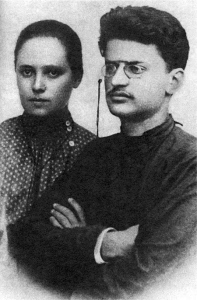
Aleksandra Sokolovskaya with Trotsky, about 1902
Photo: Wikipedia
(Clearly, heterosexual women who are revolutionaries don’t fit so well into this theory, hence the embarrassingly false portrayals of Larissa Reisner, Natalya Sedova – as a vacuous, coquettish artist, and Aleksandra Sokolovskaya – the woman who won Trotsky to Marxism, and who remained a leader of the Bolshevik Party and of the Left Opposition for forty years, until she was exiled and murdered by the Stalinist thugs in 1938, makes a brief appearance in Trotsky as a naïve peasant. Bolshevik women are an enigma, beyond the comprehension of the makers of this series.)
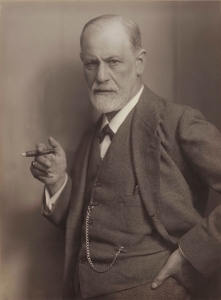
Sigmund Freud about 1921
Photo: Wikipedia
Freud responds: “You are a rare type of sexual aggressor… Your psyche type is known to kill at once, but something keeps you from finishing your victim. May it be weakness? [on coming closer to Trotsky:] How quickly your pupils contract. I’ve seen that in only two types – serial killers and religious zealots…”
[Fired up by these Freudian insights, Trotsky speaks at a revolutionary workers congress]
Trotsky: “Revolution is a woman. She needs a true man. Be men! Inseminate her! Long live the cleansing through blood!”
(This speech, let us note in passing, is more akin to fascist demagogy than to revolutionary socialism.)
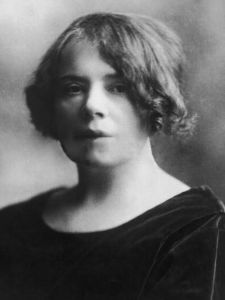
Natalya Sedova, about 1910. Photo: http://www.parisrevolutionnaire.com
[Trotsky continues in conversation with Sedova:] “That’s what the nation is, a weak girl. The masses have a female psychology. You are passive by nature…”
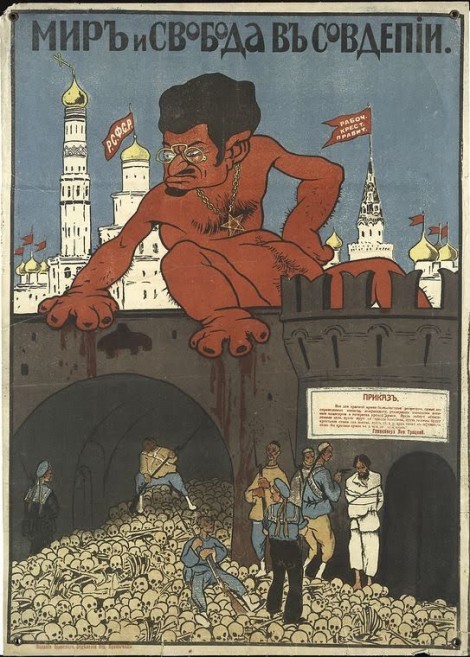
Poster produced by the White counter-revolution during the Civil War period. There is nothing new in the anti-Semitic portrayal of Trotsky as a mass murderer.
The creators of this garbage have no original ideas, not even reactionary ones. The inventions and frame-ups cooked up to dramatize this TV show are nothing but a regurgitation of the old slanders used against the Bolshevik revolution in 1917 and the civil war years (the Bolsheviks are paid agents of the German government sent to weaken and demoralise Russia; Lenin and Trotsky are bloodthirsty murderers, desecrators of the churches and cemeteries of good Christians; the revolution is nothing but a conspiracy of Jews) overlaid with the lies and mythology of the Stalinist epoch (the Stalin-Trotsky split was merely a clash of personalities; Stalin the proletarian defeated Trotsky the petty-bourgeois intellectual; Stalin stood for the revolution while Trotsky recoiled against it; the frame-ups and murders of the 1930s were the inevitable consequence of the revolution; and so on.)
Anti-Semitic conspiracy is their stock-in-trade. It is somehow shocking how shamelessly that card is laid on the table in the very first episode. But we should not be shocked. This is the way these people think, and they are not ashamed of it in the least.
Similarly with the misogynist venom. This series is produced by a tentacle of the same state that recently decriminalised ‘moderate’ forms of domestic violence, in a country where the Ministry of Internal Affairs has estimated that each year 14,000 women die from injuries inflicted by their partners. It reflects the thinking of these rulers.
The problem with this TV series is not the deliberate falsification of history, such as there was in the Stalin epoch; the problem is that the stunted imagination of the bourgeoisie in its senile phase cannot conceive of revolution in any other terms than they present here.
They simply cannot imagine such a thing as a woman who is a revolutionary, who thinks for herself, or a Jew who is an honest fighter, or a worker who is anything other than a vile brute, an ‘instrument’ who needs to be ‘controlled.’ They cannot conceive of a revolutionary leader who is anything other than a sexual aggressor and a megalomaniacal egotist. They cannot understand the process of the working class finding and testing its revolutionary leadership as anything other than the machinations of backroom promoters and moneyed gangsters. All they can do is to project onto these historical figures their own thuggish methods and chauvinist prejudices, their own lies, their own lust for ‘cleansing through blood,’ and their own raging egos and brutish stupidity. This really is the best they can do.
Even in advance of any catastrophic economic collapse, the political and cultural crisis of capitalism is accelerating today.

Capitalism’s World Disorder, by Jack Barnes, describes the pornographication of bourgeois politics
One aspect of their political crisis – where ideological and political differences between the bourgeois parties have dwindled to insignificance, yet the parties themselves have become more fractured and factional than ever – is the tendency of politics to reduce itself to scandal-mongering. Allegations of corruption and illegal activity, digging the dirt on sex scandals involving this or that political figure, all manner of accusations unsupported by evidence – these things move to centre stage of political discourse. Police and spy agencies play an increasing political role in politics. The ultra-right thrives on it, decrying in salacious terms the decadence of the ruling stratum. As far back as the early 1990s this tendency was described by US socialist leader Jack Barnes as the pornographication of politics.3
With Trotsky, the disease of pornographication spreads from politics to infect historical drama, for history is, as always, an extension of politics. This cultural product is the story of the Russian bourgeoisie brought back from the dead, its obscene history of itself.
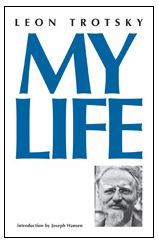
Trotsky’s autobiography is a good place to start for an understanding of the Russian revolution and civil war, and of Trotsky’s role in these events.
Watching Trotsky will yield no insights about the revolution of 1917, nor about Trotsky’s life. One would have a better chance of learning the truth about the dispossession of the native Americans by watching Hollywood westerns. As a window on the mentality of the Russian ruling class, it might have a little more value. If you can stomach it.
Notes:
- The series is now available on Netflix with English subtitles
- There is an account of the torpedo boat attack in Trotsky’s autobiography, My Life. Reisner’s participation in it, and a wealth of other biographical detail and excerpts from her letters and writings, can be found in Larissa Reisner, a biography by Cathy Porter, Virago 1988 – unfortunately out of print now.
- See Capitalism’s World Disorder, by Jack Barnes, Pathfinder, 1999

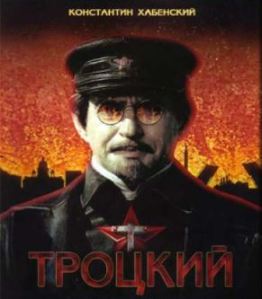
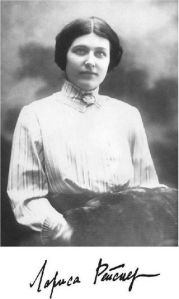
Russia did not decriminalise domestic abuse. The problem was, there was too high a penalty for minor domestic incidents so the police were not enforcing the law. Now they are more able to attend, record and keep track of incidents and offer more protection in line with Western policing, because there is no longer such a punitive escalation at a low
threshold.
When your article is one decrying falsification and extremist bias about historical events, you would expect one to be more careful about consuming and propogating the false narratives about modern Russia so easily. Modern Russia is trying to come to grips with not only the contradictions and oppressions of its Soviet past, but also the depravity of pauper-state enforced on it in the 90s, ready to be balkanised, until Putin pushed back against the Western elite ready to carve it up. Now, the current full spectrum “cost-imposition” strategy on Russia for daring to assert its trade rights, its sovereignty and strategic interests.
All history, dramatised or not, serve the propaganda goals of the supporting regime; that’s nothing new, and you’re right to point this example out. But the best counter is to support a more multi-dimensional view of the current reality, thereby putting propaganda in its place.
Paul, you say ” The problem was, there was too high a penalty for minor domestic incidents so the police were not enforcing the law.” If I understand you correctly, this means that the police felt that the penalties for violence against women were too high, so decided not to enforce the law. If that is the case, then there clearly was/is a major problem with the police and justice system that is unlikely to be fixed by reducing the penalties for domestic violence to a level the police think is more reasonable..
According to the Guardian, “Controversial amendments to Russian law decriminalised some forms of domestic violence in February 2017. The changes mean violence against a spouse or children that results in bruising or bleeding but not broken bones is punishable by 15 days in prison or a fine of 30,000 roubles (£380) if they do not happen more than once a year. Previously, these offences carried a maximum jail sentence of two years. … A total 36,037 domestic violence cases were reported in 2017, compared with 65,543 in 2016, with 25,667 of the 2017 cases involving violence against women, compared with 49,765 cases the year before.”
Note that not only has the number of incidents reported dropped by 45%, but also the proportion of those reported incidents which involved violence against women has dropped from 76% to 71%.
The Guardian also reports that with a large number of such cases resulting in fines rather than jail time for the abuser, and usually the victim of violence shares a bank account with her abuser, this means that frequently, when the abuser refuses to pay the fine, the court pursues the victim demanding that she pay the fine. Also, it is now the complainant’s responsibility to gather all the medical reports and evidence herself, a task which had previously been the responsibility of the police (see article linked in blog post).
https://www.theguardian.com/world/2018/aug/16/decriminalisation-of-domestic-violence-in-russia-leads-to-fall-in-reported-cases
https://www.theguardian.com/world/2017/dec/19/russian-victims-domestic-violence-abuse-forced-pay-perpetrator-fines
Do this test: go to the wikipedia page of the tv series and check each of the characters that were the founders of communism. Then try to find one that was NOT a jew. Then come back and try to claim again that communism was not a “jewish conspiracy”
The ‘test’ you suggest would only prove that the makers of this TV series believe that the revolution was a Jewish conspiracy, and that they have played fast and loose with historical fact in order to make their case seem plausible. But that is what I have already said in my review.
The Jews in the old Russian empire were an oppressed and marginalised nationality, which was also mainly urbanised. For those reasons, they played a role in working class political struggles disproportionate to their numbers in the population. People of Jewish ancestry were prominent in the leadership of the Bolshevik Party (including Trotsky, Kamenev, Radek, Zinoviev, and Sverdlov, I believe). Jews were also prominent the Menshevik Party (including the central leader, Martov), which formed part of the counter-revolution. So, were both the revolution AND the counter-revolution Jewish conspiracies? This kind of reasoning is not just foolish, but deeply reactionary.
For anyone who would like to know more about who among the leaders of the Russian revolution was Jewish, this Jerusalem Post article lists many of them. It may be a source of pride to Jewish revolutionaries, and rightly so. But don’t expect to learn anything useful about the causes and character of the Russian revolution from it.
Honestly, the most entertaining part of the series was when Larissa Reisner takes off her clothes, though it does communicate the moral obtuseness and depravity of communists pretty well, even if it could have done so in maybe two hours, tops.
Reblogged this on My Blog.
True, in October 1917 only minority of Jews associated themselves with Bolsheviks, though after pogroms in 1918-1919 they began joining the Bolshevik party in mass. However, only Jewish energy and courage made the October uprising victorious. Lenin once exclaimed: “What? No Jew is siting in this commission? Nothing good would come out of it!”